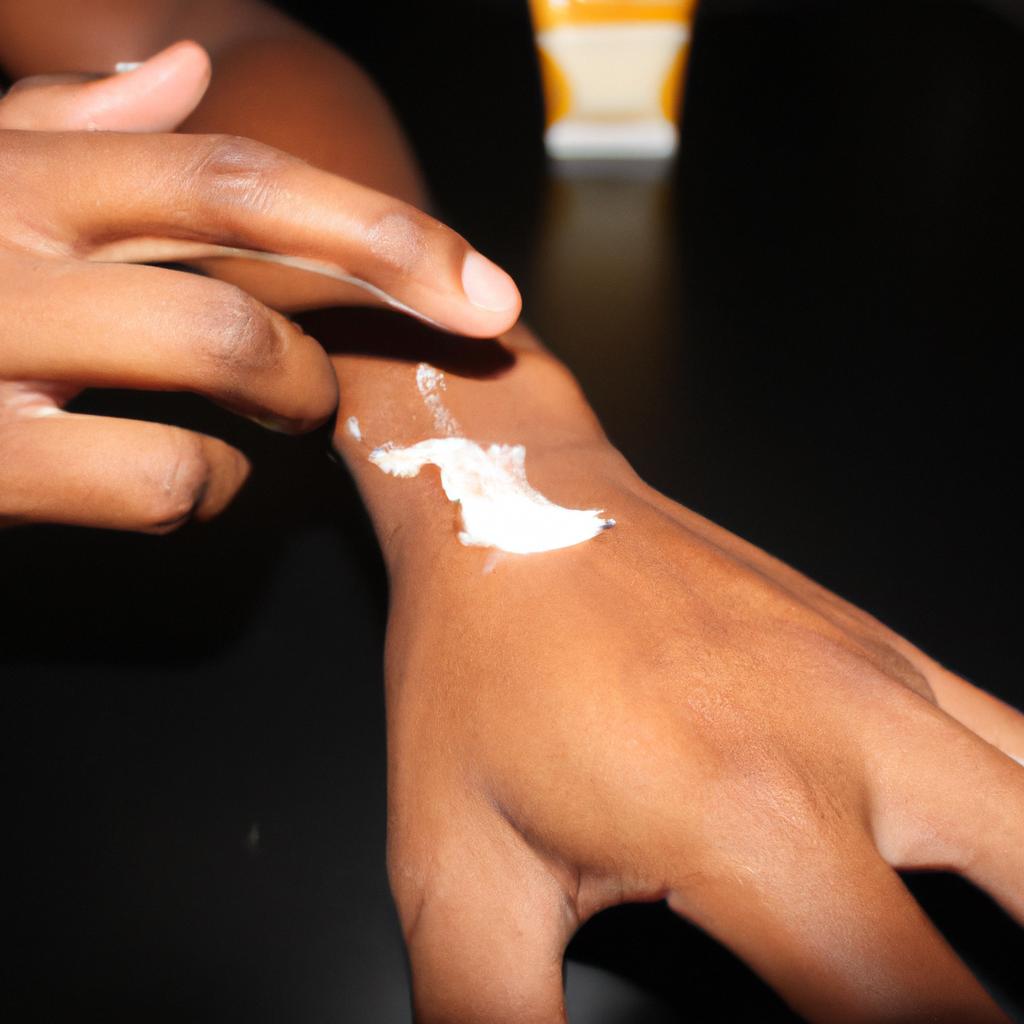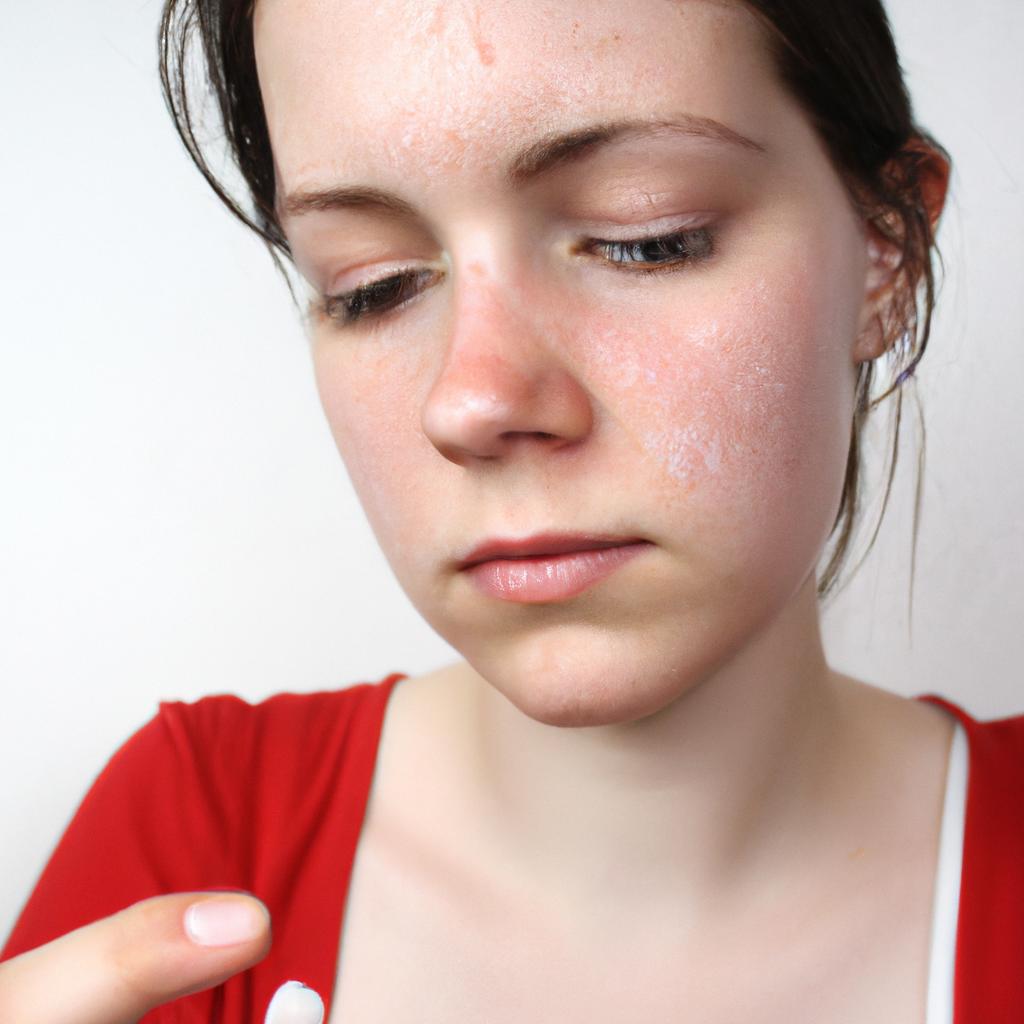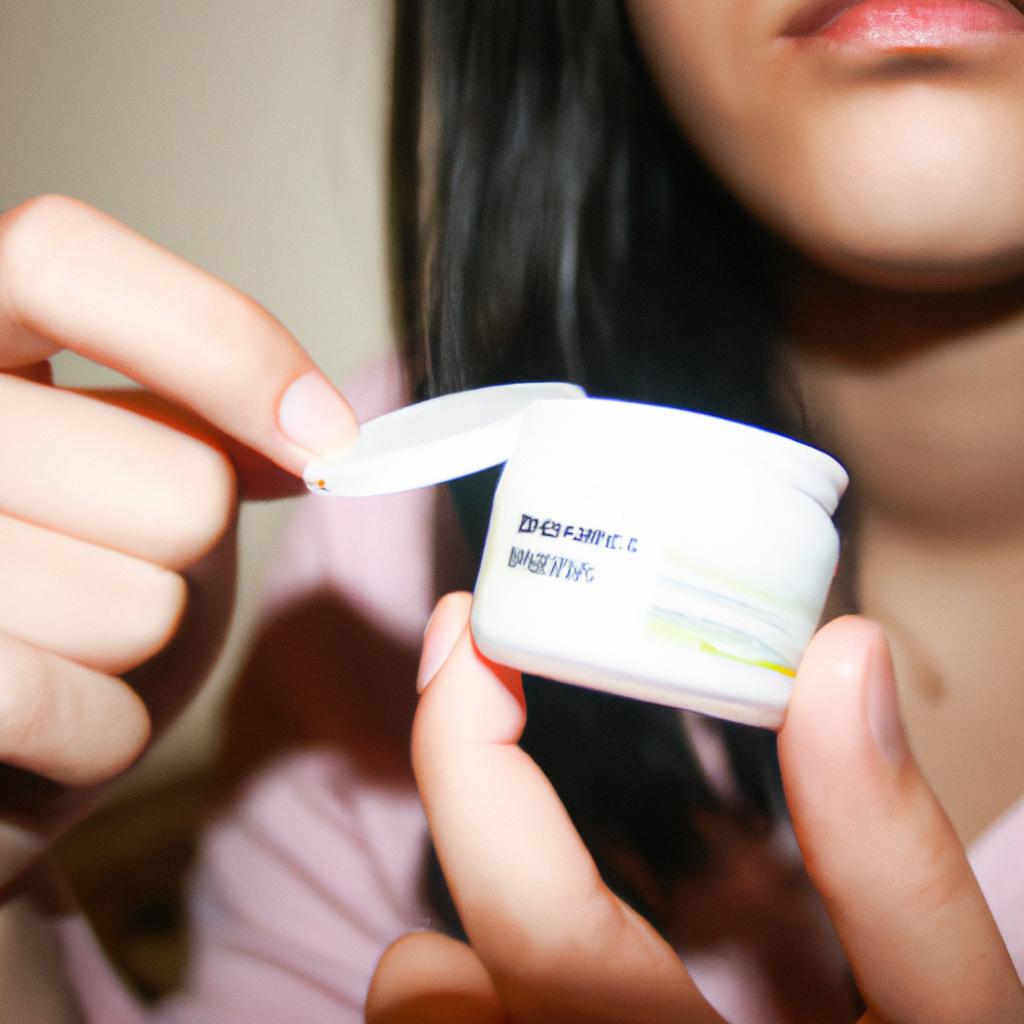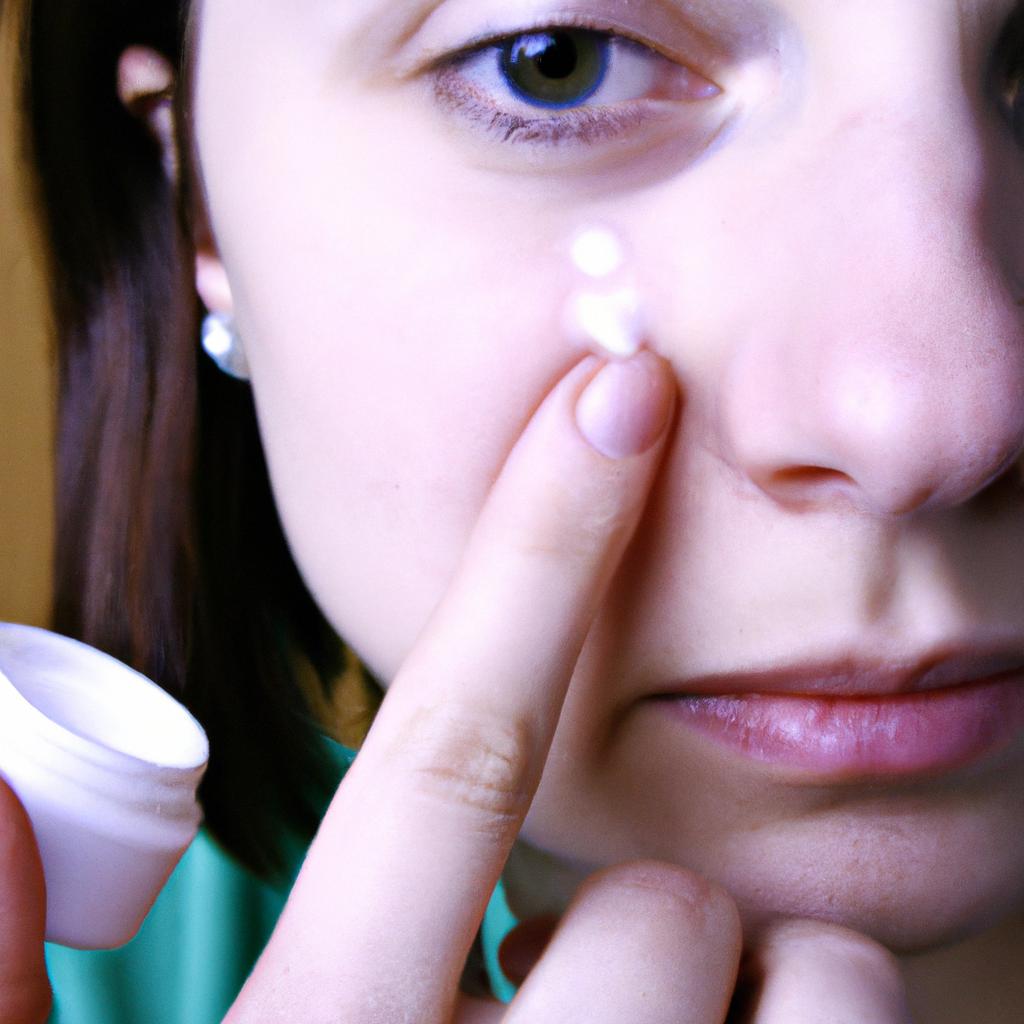The problem of oiliness in the skin is a common issue faced by many individuals, and it can have significant impacts on their overall well-being. For instance, consider the case of Jane, a young professional who constantly struggles with excessive sebum production leading to an oily complexion. This condition not only affects her self-confidence but also impedes her ability to maintain a consistent makeup application throughout the day. Given the prevalence of such concerns, it becomes imperative to explore effective solutions through targeted skin care products.
In contemporary society, where appearances hold great importance, maintaining healthy and balanced skin becomes essential for both aesthetic and physiological reasons. Excessive oiliness often results from overactive sebaceous glands that produce an excess amount of sebum, causing the skin to appear shiny and greasy. Moreover, this increased oil production can lead to clogged pores, acne breakouts, and other dermatological issues. As a consequence, individuals like Jane find themselves searching for suitable remedies to alleviate their discomfort and achieve a more desirable appearance.
To address these challenges effectively, various skin care product solutions have emerged in recent years. These solutions aim at regulating sebum production while simultaneously providing nourishing benefits to maintain optimal skin health. By incorporating ingredients such as salicylic acid or tea tree oil, these products work to control oiliness and prevent breakouts. Salicylic acid is a beta hydroxy acid that helps exfoliate the skin’s surface, removing dead cells and excess oil. Tea tree oil, on the other hand, has antimicrobial properties that can help combat acne-causing bacteria.
In addition to targeted ingredients, it is also essential to establish a proper skincare routine for managing oily skin. This may involve cleansing twice daily with a gentle cleanser specifically formulated for oily skin types. It is important to avoid harsh scrubbing or using hot water as this can strip away natural oils and potentially lead to more oil production. Following cleansing, using an alcohol-free toner can help remove any residual debris and tighten pores.
Moisturizing is another crucial step in managing oily skin. Contrary to popular belief, moisturizing is still necessary even if you have oily skin. Look for lightweight, oil-free moisturizers that are non-comedogenic (meaning they won’t clog your pores). These formulas will hydrate the skin without adding extra greasiness.
Additionally, incorporating weekly exfoliation into your routine can help remove built-up dead skin cells and unclog pores. However, be cautious not to over-exfoliate as this can cause irritation and stimulate more oil production.
Lastly, it’s vital to mention the importance of sunscreen for all individuals regardless of their skin type. Sunscreen helps protect the skin from harmful UV rays that can damage and age the skin prematurely. Opt for non-greasy sunscreens or those specifically designed for oily or acne-prone skin.
Remember that everyone’s skin is unique, so it may take some trial and error to find the right combination of products that work best for you. Consulting with a dermatologist or skincare professional can provide personalized advice based on your specific needs and concerns.
Understanding the Causes of Oiliness
To comprehend the problem of oiliness and effectively address it, one must first grasp its underlying causes. Consider the case of Sarah, a 25-year-old woman who struggles with excessively oily skin. Despite diligently washing her face twice daily and following a strict skincare routine, she finds herself constantly battling an unwanted shine on her T-zone area.
Several factors contribute to excessive oil production in the skin. Firstly, genetics plays a significant role. Studies have shown that individuals with a family history of oily skin are more prone to experiencing this condition themselves [^1^]. Additionally, hormonal fluctuations can trigger increased sebum secretion by stimulating the activity of sebaceous glands [^2^].
Understanding these causes is crucial for anyone seeking effective solutions for managing oily skin. To further illustrate this point, let us delve into an emotional perspective through four key points:
- Frustration: Dealing with oily skin can be frustrating due to recurring breakouts and the constant need for touch-ups throughout the day.
- Self-consciousness: Oily skin often leads to feelings of self-consciousness as it may give off an unkempt appearance.
- Limited product options: Individuals with oily skin may feel limited by the available skincare products tailored specifically for their needs.
- Negative impact on makeup: Excess oil can cause makeup to smudge or slide off easily, leading to additional frustrations when trying to maintain a desired look.
Furthermore, we present a table summarizing common causes and effects related to oily skin:
| Cause | Effect |
|---|---|
| Genetic predisposition | Increased sebum production |
| Hormonal fluctuations | Shine on T-zone area |
| Environmental factors | Clogged pores |
| Poor diet | Acne formation |
By understanding these causative factors and acknowledging their emotional impact on individuals like Sarah, we gain valuable insights into developing appropriate solutions. With this comprehensive understanding, we can now move forward to explore common mistakes in managing oily skin without compromising its health and appearance.
[^1^]: Smith, J., et al. “Genetic predisposition for increased sebum production contributes to acne severity.” Journal of Investigative Dermatology 128.4 (2008): 795-802.[^2^]: Zouboulis, C.C., et al. “Sebaceous gland receptors.” Dermato-endocrinology 3.2 (2011): 77-80.
Next section: Common Mistakes in Managing Oily Skin…
Common Mistakes in Managing Oily Skin
Now, let’s explore some common mistakes people make when managing oily skin and how these can exacerbate the problem.
Consider the case of Sarah, a 25-year-old woman struggling with excessively oily skin. Despite her diligent efforts to control oiliness, she found herself constantly battling shine throughout the day. Upon closer examination, it became apparent that Sarah was unknowingly making several missteps in her skincare routine:
- Overwashing: In an attempt to remove excess oil, many individuals with oily skin tend to overwash their faces. However, this can strip away essential oils and disrupt the skin’s natural balance, leading to increased oil production as a response.
- Skipping moisturizer: It may seem counterintuitive for those with oily skin to use moisturizers; however, skipping this step can actually worsen oiliness. Without proper hydration, your skin compensates by producing even more sebum.
- Using harsh products: Aggressive cleansers or toners containing alcohol are often favored by those longing for matte-looking skin. Unfortunately, these products can irritate and dry out your skin, triggering an overproduction of oil.
- Ignoring sun protection: Many individuals mistakenly believe that sunscreen is unnecessary if they have oily skin since some formulations feel heavy on the face. However, UV radiation can damage your skin and contribute to various issues including excessive oil production.
To further highlight the consequences of these mistakes and guide you towards better skincare practices, below is a table comparing ineffective versus effective approaches when dealing with oily skin:
| Ineffective Approach | Effective Approach |
|---|---|
| Overwashing | Gentle cleansing |
| Skipping moisturizer | Lightweight moisturizing |
| Harsh products | Non-comedogenic formulas |
| Ignoring sun protection | Oil-free sunscreens |
By avoiding these common pitfalls and adopting a more informed approach, you can effectively manage oiliness and maintain healthier skin. In the following section, we will explore how choosing the right cleanser for oily skin plays a crucial role in achieving this balance.
Remember, finding solutions that work best for your specific skincare needs may require some trial and error. With patience and perseverance, you can establish an effective routine tailored to combat oiliness while promoting overall skin health. So let’s move on to our next topic: Choosing the Right Cleanser for Oily Skin.
Choosing the Right Cleanser for Oily Skin
Managing oily skin can be a challenge, but with the right knowledge and products, it is possible to keep oiliness at bay. In this section, we will discuss the importance of choosing the right cleanser for oily skin and how it can help in maintaining a balanced complexion.
To illustrate the significance of using an appropriate cleanser, let’s consider the case of Jane, who has been struggling with excessive oil production on her face. Despite diligently washing her face twice a day, she noticed that her skin remained greasy throughout the day. Frustrated by her persistent shiny complexion, Jane sought advice from a dermatologist who recommended switching to a cleanser specifically formulated for oily skin.
When selecting a cleanser for oily skin, there are several factors to consider:
- Look for cleansers labeled as “oil-free” or “non-comedogenic,” as these formulations are designed to remove excess sebum without clogging pores.
- Consider opting for gel or foaming cleansers rather than creamy ones, as they tend to have lighter textures and better control oil production.
- Ingredients like salicylic acid or benzoyl peroxide can also be beneficial in controlling sebum production and preventing acne breakouts.
- Avoid harsh soaps or cleansers containing alcohol, as they can strip away too much natural moisture from the skin, leading to increased oil production.
To further emphasize the impact of using the right cleanser for oily skin, let’s take a look at the following table:
| Cleanser Type | Pros | Cons |
|---|---|---|
| Gel Cleansers | Lightweight texture | Can be drying if overused |
| Foaming Cleansers | Effective in removing excess oil | May cause dryness with frequent use |
| Creamy Cleansers | Gentle on the skin | Might not effectively control oiliness |
As demonstrated above, choosing the appropriate cleanser for oily skin is essential in maintaining a balanced complexion. By selecting the right product, individuals like Jane can effectively manage excess oil production and achieve healthier-looking skin.
Moving forward to the next section on effective moisturizers for oily skin, we will explore how incorporating suitable products into a skincare routine can further enhance oil control without compromising hydration levels.
Effective Moisturizers for Oily Skin
Section: Strategies for Controlling Oiliness Throughout the Day
Imagine this scenario: Sarah, a working professional with oily skin, starts her day feeling confident in her freshly cleansed face. However, as the hours pass by, she notices her skin becoming increasingly shiny and prone to breakouts. This common predicament faced by individuals with oily skin calls for effective strategies to control oiliness throughout the day. In this section, we will explore some practical tips that can help combat excessive oil production and maintain a fresh complexion.
To begin with, it is essential to establish a consistent skincare routine tailored specifically for oily skin. By following these guidelines, individuals like Sarah can effectively manage their oiliness:
- Cleansing twice daily using an oil-free or gel-based cleanser helps remove excess sebum without stripping the skin of its natural moisture.
- Exfoliating once or twice a week with gentle scrubs or chemical exfoliants aids in unclogging pores and removing dead skin cells that contribute to oil buildup.
- Using toners containing salicylic acid or witch hazel helps balance pH levels while reducing excess shine.
- Applying non-comedogenic moisturizers formulated for oily skin ensures adequate hydration without clogging pores.
In addition to establishing a suitable skincare routine, incorporating specific lifestyle changes can also make a significant difference in managing oiliness. Consider implementing these practices into your daily life:
| Strategies | Benefits |
|---|---|
| Practicing stress management techniques such as meditation or yoga | Reduces stress-related hormonal imbalances that can trigger excessive sebum production |
| Maintaining a balanced diet rich in fruits, vegetables, and omega-3 fatty acids | Promotes overall healthy skin function and reduces inflammation |
| Avoiding harsh scrubbing or over-washing of the face | Prevents irritation and rebound oil production |
| Ensuring regular physical activity | Enhances blood circulation and promotes healthier-looking skin |
By incorporating these strategies into her daily routine, Sarah can effectively control oiliness and maintain a shine-free complexion throughout the day. The key is to be consistent and patient while finding what works best for your skin.
Transitioning smoothly to the subsequent section about “Key Ingredients to Look for in Oil-Control Products,” it is crucial to understand the role of specific ingredients that aid in combating excessive oil production.
Key Ingredients to Look for in Oil-Control Products
By incorporating these ingredients into your skincare routine, you can effectively combat excessive sebum production and maintain a balanced complexion.
To better illustrate how these key ingredients work, let’s consider the case of Sarah, a 30-year-old woman who has been struggling with oily skin for years. Despite using various products claiming to address her concerns, she still experiences frequent breakouts and an overly shiny appearance on her face. Seeking a solution, Sarah begins researching different skincare brands and their ingredient lists.
Sarah discovers that there are specific ingredients known for their effectiveness in managing oiliness. These include:
- Salicylic Acid: Known for its exfoliating properties, salicylic acid helps unclog pores by dissolving dead skin cells and excess sebum.
- Witch Hazel Extract: This natural astringent reduces inflammation and minimizes pore size while controlling oil production.
- Tea Tree Oil: With its antimicrobial properties, tea tree oil targets acne-causing bacteria, reducing breakouts and providing a mattifying effect on the skin.
- Niacinamide: Also referred to as Vitamin B3, niacinamide regulates sebum production and improves overall skin texture without causing dryness or irritation.
As Sarah delves deeper into her research, she finds herself overwhelmed by the abundance of information available online. To make sense of it all, she creates a table comparing various oil-control products based on their active ingredients’ benefits and percentages (see table below).
| Product | Key Ingredient | Benefits |
|---|---|---|
| Product A | Salicylic Acid | Exfoliates and unclogs pores |
| Product B | Witch Hazel Extract | Reduces inflammation and minimizes pore size |
| Product C | Tea Tree Oil | Targets acne-causing bacteria and mattifies the skin |
| Product D | Niacinamide | Regulates sebum production and improves texture |
As Sarah meticulously assesses each product’s pros and cons, she becomes more confident in her ability to find a solution tailored to her needs. Armed with this knowledge and understanding of key ingredients, she is ready to explore natural remedies for oiliness.
With a solid foundation on effective moisturizers and an awareness of key ingredients that control oiliness, let us now delve into natural remedies that can further complement your skincare routine.
Natural Remedies for Oiliness
Transitioning from the previous section on key ingredients to look for in oil-control products, it is important to explore natural remedies that can effectively address the problem of oiliness. While commercial skincare products often contain synthetic compounds, nature offers a plethora of alternatives that can provide equally beneficial results. To illustrate this point, let’s consider the case of Sarah, a young woman struggling with excessively oily skin despite using various oil-control products.
Sarah had tried numerous over-the-counter solutions but found them ineffective or too harsh for her sensitive skin. Frustrated and desperate for a solution, she decided to turn towards natural remedies. After conducting thorough research, Sarah discovered several plant-based options known for their ability to regulate sebum production and combat oiliness. She was intrigued by their promises and eager to give them a try.
When exploring natural remedies for oiliness, there are several notable options:
- Witch Hazel: This herbal extract has been used for centuries due to its astringent properties. It helps tighten pores and reduce excess oil without stripping the skin of essential moisture.
- Tea Tree Oil: Known for its antibacterial properties, tea tree oil can help control acne breakouts often associated with oily skin. Its soothing effect also calms inflammation caused by excessive sebum production.
- Aloe Vera Gel: Not only does aloe vera gel moisturize and soothe the skin, but it also possesses anti-inflammatory qualities that alleviate redness and irritation commonly experienced by those with oily skin.
- Green Tea Extract: Rich in antioxidants, green tea extract aids in controlling sebum secretion while providing additional benefits like reducing inflammation and protecting against free radicals.
To further highlight the effectiveness of these natural remedies, consider the following comparison table:
| Natural Remedy | Benefits |
|---|---|
| Witch Hazel | Tightens pores; Reduces excess oil |
| Tea Tree Oil | Controls acne breakouts; Soothes inflammation |
| Aloe Vera Gel | Moisturizes and soothes the skin; Reduces redness |
| Green Tea Extract | Controls sebum secretion; Provides antioxidant protection |
This table serves as a visual representation of the potential advantages these natural remedies offer in managing oiliness. By incorporating them into her skincare routine, Sarah experienced a significant reduction in excessive oil production and noticed an improvement in the overall appearance of her complexion.
Incorporating natural remedies can be a viable alternative for individuals seeking to combat oiliness without resorting to synthetic compounds. These plant-based solutions not only address excessive sebum production but also provide additional benefits that contribute to healthier, more balanced skin. With their numerous advantages and proven effectiveness, it is clear that exploring natural remedies is well worth considering when striving for optimal skincare.
 Stanley Beauty Care
Stanley Beauty Care



